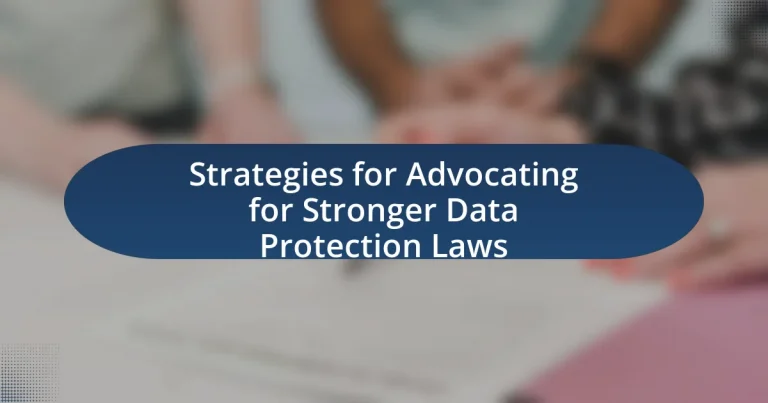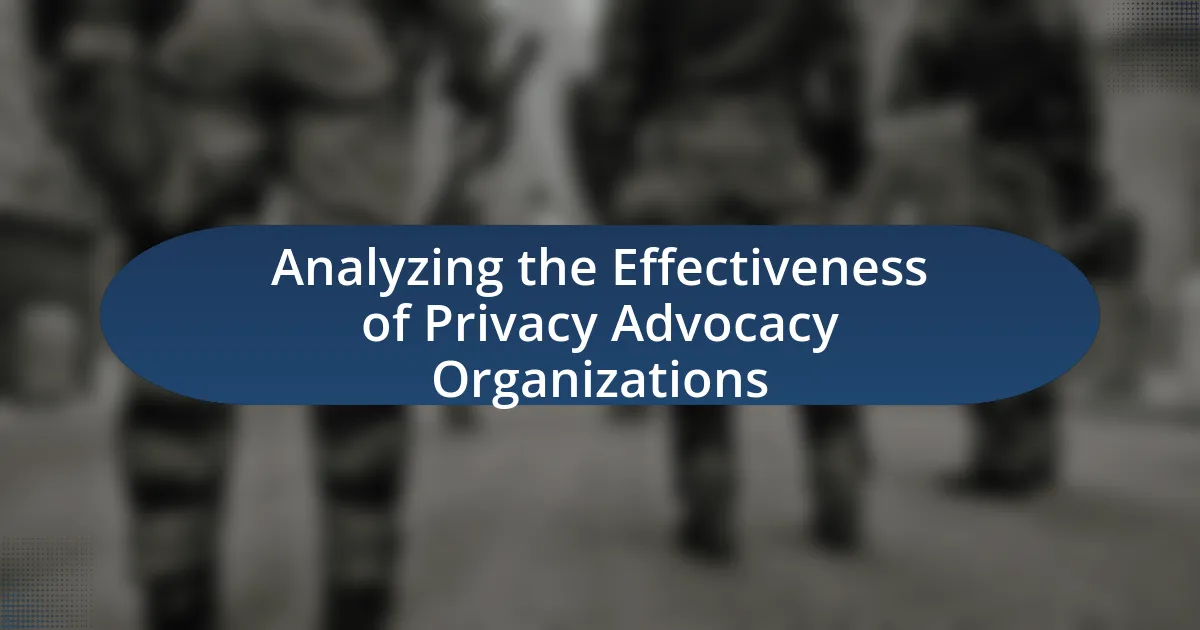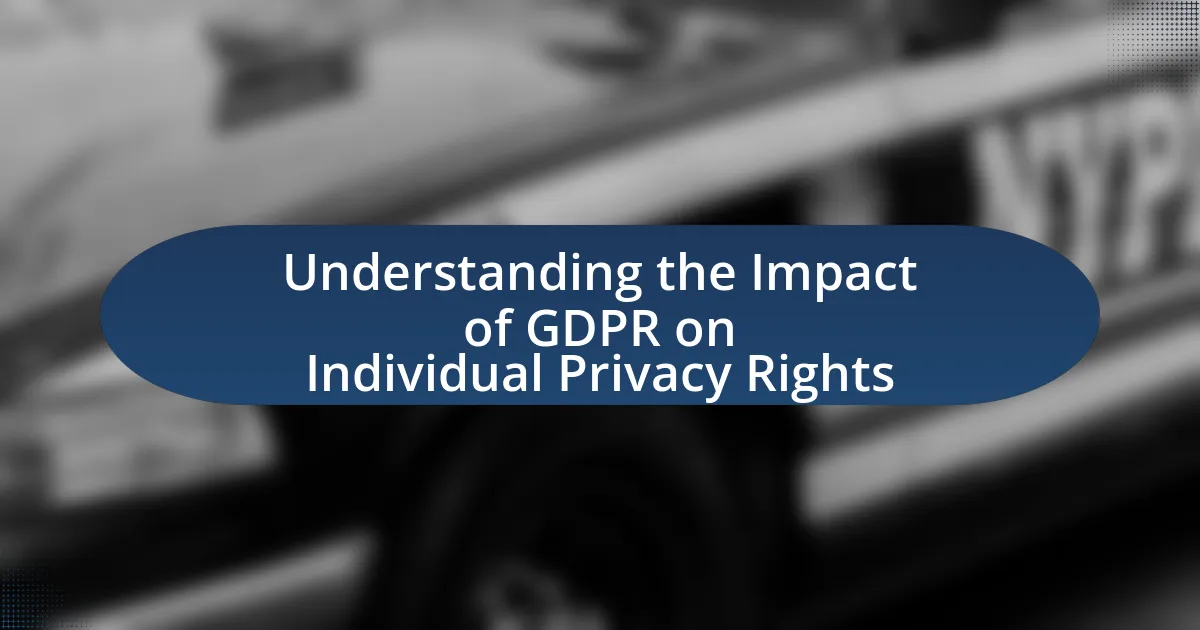The article focuses on strategies for advocating for stronger data protection laws, emphasizing the importance of raising public awareness, engaging with policymakers, building coalitions, and leveraging data-driven evidence. It discusses how public awareness campaigns can influence legislation by educating citizens about their data rights and mobilizing support for stronger regulations. Additionally, the article highlights the role of advocacy groups in promoting data protection laws, the significance of collaboration with technology companies, and the challenges faced in the current political landscape. It also addresses common misconceptions about data protection laws and outlines specific actions individuals can take to support advocacy efforts.
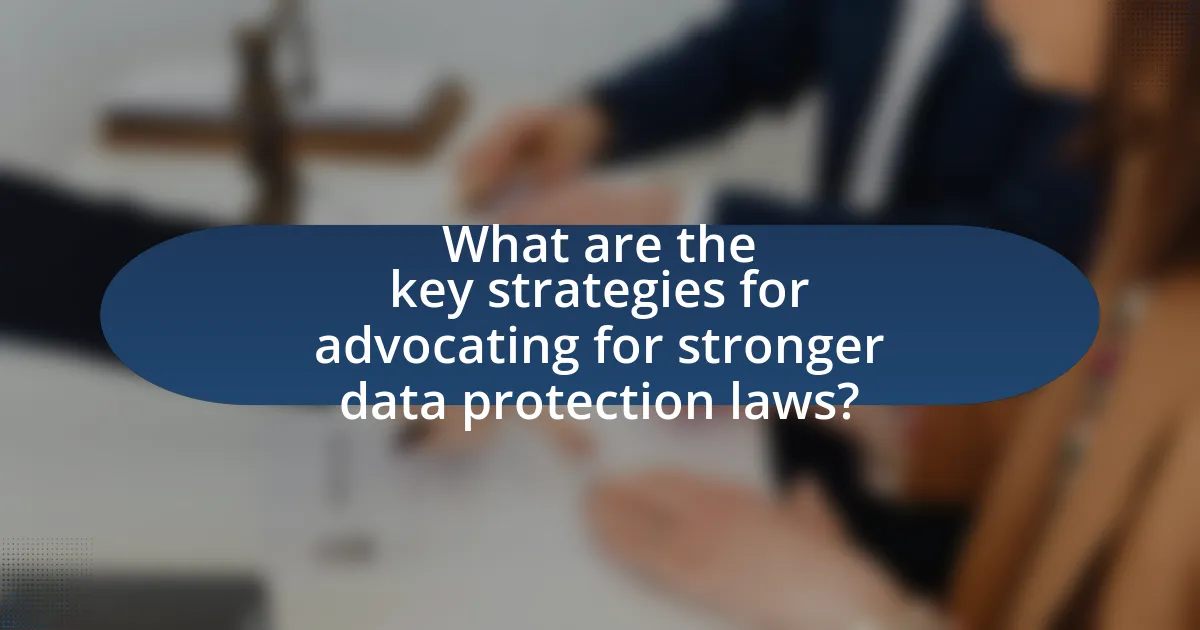
What are the key strategies for advocating for stronger data protection laws?
Key strategies for advocating for stronger data protection laws include raising public awareness, engaging with policymakers, building coalitions, and leveraging data-driven evidence. Raising public awareness involves educating citizens about their data rights and the implications of data misuse, which can mobilize grassroots support. Engaging with policymakers requires presenting clear, actionable proposals that highlight the need for stronger regulations, often supported by case studies of data breaches and their consequences. Building coalitions with civil society organizations, tech companies, and legal experts can amplify advocacy efforts and create a unified front. Leveraging data-driven evidence, such as statistics on data breaches and their economic impact, strengthens the argument for reform by demonstrating the urgency and necessity of enhanced protections.
How can public awareness campaigns influence data protection legislation?
Public awareness campaigns can significantly influence data protection legislation by educating the public about privacy issues and mobilizing them to advocate for stronger laws. These campaigns raise awareness of data breaches and misuse, leading to increased public demand for legislative action. For instance, the European Union’s General Data Protection Regulation (GDPR) was partly a response to heightened public concern over data privacy, driven by campaigns that highlighted the risks of data exploitation. Research shows that when citizens are informed about their rights and the implications of data misuse, they are more likely to support and push for comprehensive data protection measures, thereby prompting lawmakers to respond to these demands.
What methods can be used to effectively raise public awareness?
To effectively raise public awareness, utilizing social media campaigns is essential, as they can reach a vast audience quickly and engage users interactively. Research indicates that social media platforms like Facebook and Twitter have over 3.6 billion users globally, making them powerful tools for disseminating information and mobilizing support. Additionally, organizing community events, such as workshops and seminars, fosters direct engagement and allows for in-depth discussions on data protection issues. According to a study by the Pew Research Center, 70% of participants reported that attending community events increased their understanding of local issues. Collaborating with influencers and advocacy groups can amplify messages, as these entities often have established trust and credibility with their audiences.
How does public opinion shape legislative priorities?
Public opinion significantly shapes legislative priorities by influencing lawmakers’ decisions and actions. When a substantial portion of the electorate expresses strong views on specific issues, such as data protection, legislators often prioritize these concerns to align with constituents’ preferences and secure electoral support. For instance, surveys indicate that a majority of voters favor stricter data protection laws, prompting legislators to introduce and support relevant bills. This responsiveness to public sentiment is evident in the passage of the General Data Protection Regulation (GDPR) in the European Union, which was largely driven by public demand for enhanced privacy protections.
What role do advocacy groups play in promoting data protection laws?
Advocacy groups play a crucial role in promoting data protection laws by raising public awareness, influencing policymakers, and mobilizing community support. These organizations often conduct research and disseminate information about the importance of data privacy, which helps to inform the public and create a demand for stronger regulations. For instance, groups like the Electronic Frontier Foundation and Privacy International actively engage in lobbying efforts, providing expert testimony and drafting policy proposals that highlight the need for comprehensive data protection measures. Their efforts have been instrumental in shaping legislation, as seen in the development of the General Data Protection Regulation (GDPR) in the European Union, which was influenced by advocacy campaigns emphasizing individual rights and corporate accountability.
How can advocacy groups mobilize community support?
Advocacy groups can mobilize community support by engaging in grassroots organizing, which involves building relationships with community members and fostering a sense of shared purpose. This approach is effective as it encourages local participation and empowers individuals to take action on issues that affect them directly. For instance, research from the Stanford Social Innovation Review highlights that grassroots movements can increase public awareness and drive policy change by leveraging community networks and local leaders. By utilizing social media campaigns, hosting community events, and providing educational resources, advocacy groups can effectively raise awareness about data protection laws and motivate community members to advocate for stronger regulations.
What strategies can advocacy groups use to engage policymakers?
Advocacy groups can engage policymakers through targeted lobbying, coalition building, and public awareness campaigns. Targeted lobbying involves direct communication with lawmakers to present data and personal stories that highlight the importance of stronger data protection laws. Coalition building allows advocacy groups to unite with other organizations, amplifying their voice and increasing influence. Public awareness campaigns educate the general public and create grassroots support, which can pressure policymakers to prioritize data protection issues. For instance, the Electronic Frontier Foundation has successfully used these strategies to advocate for digital privacy rights, demonstrating their effectiveness in influencing legislative outcomes.
Why is collaboration with technology companies important in this advocacy?
Collaboration with technology companies is crucial in advocating for stronger data protection laws because these companies possess the technical expertise and resources necessary to develop effective solutions. Their involvement can lead to the creation of innovative technologies that enhance data security and privacy, which are essential components of robust data protection legislation. For instance, partnerships with tech firms can facilitate the development of encryption technologies and secure data storage solutions, directly addressing vulnerabilities in data handling practices. Furthermore, technology companies can provide valuable insights into the practical implications of proposed regulations, ensuring that laws are both effective and feasible. This collaboration can also foster a shared commitment to ethical data practices, ultimately leading to more comprehensive and enforceable data protection laws.
How can partnerships enhance the effectiveness of advocacy efforts?
Partnerships can enhance the effectiveness of advocacy efforts by leveraging diverse resources, expertise, and networks to amplify messages and reach broader audiences. Collaborating with organizations that share similar goals allows for the pooling of knowledge and skills, which can lead to more comprehensive strategies and innovative solutions. For instance, a study by the Stanford Social Innovation Review highlights that partnerships can increase the credibility of advocacy campaigns, as they demonstrate a united front and shared commitment to the cause. This collective approach not only strengthens the advocacy message but also fosters greater public engagement and support, ultimately leading to more impactful outcomes in the pursuit of stronger data protection laws.
What are the potential challenges in collaborating with tech companies?
Collaborating with tech companies presents several potential challenges, including differing priorities, regulatory compliance issues, and data security concerns. These companies often prioritize innovation and speed, which may conflict with the slower, more methodical approach required for effective data protection advocacy. Additionally, navigating complex regulatory environments can be difficult, as tech companies may operate across multiple jurisdictions with varying laws. Data security concerns also arise, as sharing sensitive information can expose organizations to risks of breaches or misuse. These challenges necessitate careful negotiation and alignment of goals to ensure successful collaboration.
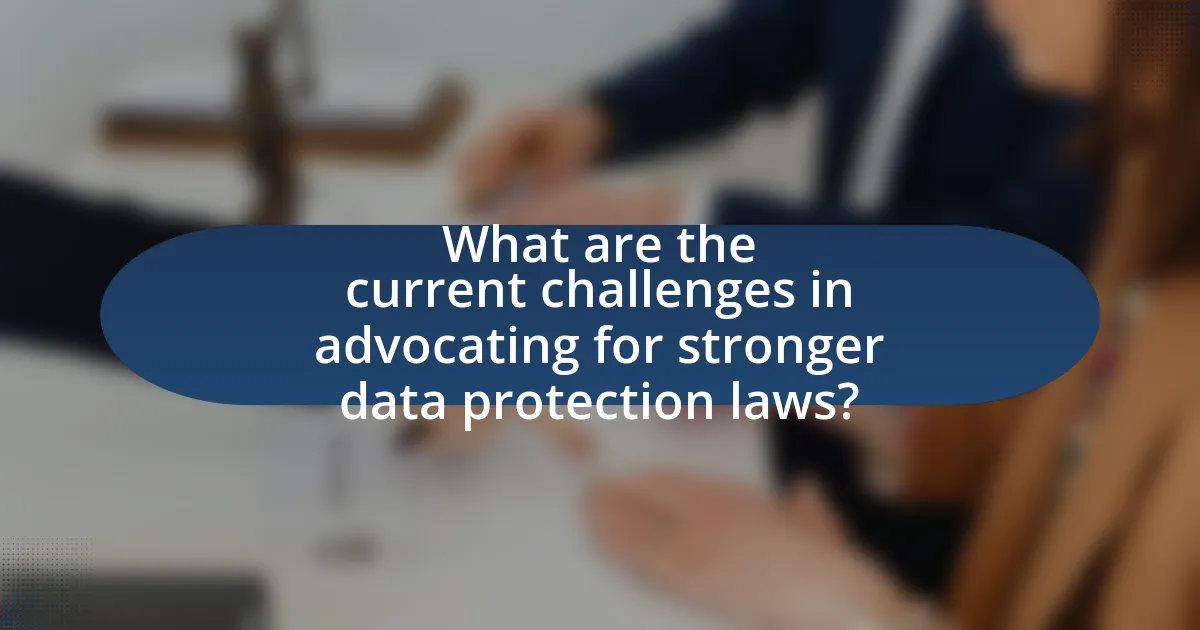
What are the current challenges in advocating for stronger data protection laws?
Current challenges in advocating for stronger data protection laws include political resistance, lack of public awareness, and the rapid pace of technological change. Political resistance often stems from lobbying by large tech companies that prioritize profit over privacy, making it difficult to pass comprehensive legislation. Additionally, many individuals are unaware of the implications of data misuse, which hampers grassroots support for stronger protections. The rapid evolution of technology complicates the legal landscape, as existing laws may not adequately address new data practices, creating a gap between regulation and innovation. These factors collectively hinder the advancement of robust data protection frameworks.
How do political climates affect data protection advocacy?
Political climates significantly influence data protection advocacy by shaping the regulatory environment and public discourse surrounding privacy issues. In democratic societies, strong political support for civil liberties often leads to robust data protection laws, as seen in the European Union’s General Data Protection Regulation (GDPR), which emerged from a political commitment to privacy rights. Conversely, in authoritarian regimes, data protection advocacy may be stifled, as governments prioritize surveillance and control over individual privacy, limiting the effectiveness of advocacy efforts. For instance, countries like China have implemented extensive surveillance systems with minimal regard for data protection, demonstrating how political priorities can undermine advocacy initiatives.
What strategies can be employed to navigate political opposition?
To navigate political opposition, stakeholders can employ strategies such as building coalitions, engaging in effective communication, and leveraging public support. Building coalitions with like-minded organizations enhances influence and creates a united front, as seen in various advocacy movements where partnerships have led to successful policy changes. Effective communication involves clearly articulating the benefits of proposed data protection laws to both policymakers and the public, which can sway opinions and reduce resistance. Leveraging public support through campaigns that raise awareness about the importance of data protection can create pressure on political figures to align with constituents’ interests, evidenced by public outcry leading to legislative action in cases like the General Data Protection Regulation in the European Union.
How can advocates remain resilient in a changing political landscape?
Advocates can remain resilient in a changing political landscape by continuously adapting their strategies and fostering strong coalitions. Adapting involves staying informed about political shifts, understanding new regulations, and being flexible in advocacy approaches. Building coalitions with diverse stakeholders enhances influence and provides support during challenging times. For instance, the American Civil Liberties Union (ACLU) has successfully navigated political changes by forming alliances with technology companies and civil society organizations, which has strengthened their advocacy for data protection laws. This collaborative approach not only amplifies their voice but also creates a united front that can effectively respond to political challenges.
What are the common misconceptions about data protection laws?
Common misconceptions about data protection laws include the belief that they only apply to large corporations, that compliance is optional, and that data protection is solely the responsibility of the IT department. In reality, data protection laws, such as the General Data Protection Regulation (GDPR), apply to any organization that processes personal data, regardless of size. Compliance is mandatory, and organizations can face significant fines for non-compliance, with GDPR fines reaching up to 4% of annual global turnover. Furthermore, data protection is a cross-departmental responsibility, requiring involvement from legal, HR, marketing, and IT teams to ensure comprehensive adherence to regulations.
How can advocates effectively address these misconceptions?
Advocates can effectively address misconceptions by employing clear communication strategies that educate the public and policymakers about data protection laws. This involves providing accurate information through workshops, social media campaigns, and informational materials that clarify the benefits and necessity of strong data protection. For instance, studies show that 70% of individuals are unaware of their data rights, highlighting the need for targeted educational efforts. By utilizing statistics and real-world examples, advocates can dismantle myths and foster a better understanding of data privacy issues, ultimately leading to informed public discourse and policy change.
What impact do misconceptions have on public support for data protection?
Misconceptions significantly undermine public support for data protection. When individuals hold inaccurate beliefs about data privacy, such as the idea that data protection laws hinder technological advancement, they are less likely to advocate for or support stronger regulations. Research indicates that a lack of understanding regarding the benefits of data protection can lead to apathy or opposition among the public, as seen in surveys where 60% of respondents expressed confusion about the implications of data privacy laws on their daily lives. This confusion can result in diminished trust in institutions responsible for safeguarding personal information, further weakening the push for robust data protection measures.
Why is it important to address the needs of diverse communities in advocacy?
Addressing the needs of diverse communities in advocacy is crucial because it ensures that all voices are represented and that policies reflect the realities of various groups. Inclusive advocacy leads to more equitable outcomes, as evidenced by studies showing that marginalized communities often face unique challenges that mainstream advocacy may overlook. For instance, research from the American Civil Liberties Union highlights that data protection laws must consider the specific vulnerabilities of communities of color, low-income individuals, and other marginalized groups to effectively safeguard their rights. By prioritizing diverse needs, advocacy can create comprehensive solutions that protect everyone, ultimately strengthening the overall impact of data protection laws.
How can advocates ensure inclusivity in their campaigns?
Advocates can ensure inclusivity in their campaigns by actively engaging diverse communities and incorporating their perspectives into campaign strategies. This involves conducting outreach to underrepresented groups, utilizing accessible language, and providing materials in multiple formats to accommodate different needs. Research indicates that inclusive campaigns can increase participation and support; for example, a study by the Pew Research Center found that diverse representation in advocacy efforts leads to broader public engagement and trust. By prioritizing inclusivity, advocates can create more effective and representative campaigns that resonate with a wider audience.
What are the benefits of representing diverse perspectives in advocacy efforts?
Representing diverse perspectives in advocacy efforts enhances the effectiveness and inclusivity of campaigns. This approach ensures that the needs and concerns of various communities are addressed, leading to more comprehensive and equitable solutions. For instance, research by the Center for American Progress indicates that inclusive advocacy can increase public support and engagement, as it resonates with a broader audience. Additionally, diverse perspectives can foster innovation and creativity in problem-solving, as different viewpoints contribute to a richer dialogue and more robust strategies.

What specific actions can individuals take to support stronger data protection laws?
Individuals can support stronger data protection laws by actively engaging in advocacy efforts, such as contacting their elected representatives to express support for robust privacy legislation. Research indicates that direct communication with lawmakers can significantly influence policy decisions, as constituents’ opinions are a key factor in legislative priorities. Additionally, individuals can participate in public consultations and forums organized by government bodies or advocacy groups, providing input on proposed regulations. Joining or supporting organizations that focus on data protection, such as the Electronic Frontier Foundation or Privacy International, can amplify collective efforts for stronger laws. Furthermore, educating themselves and others about data rights and privacy issues fosters a more informed public, which can lead to increased demand for legislative action.
How can individuals participate in advocacy efforts?
Individuals can participate in advocacy efforts by engaging in activities such as contacting legislators, joining advocacy groups, and raising awareness through social media campaigns. Contacting legislators allows individuals to express their opinions on data protection laws directly to decision-makers, which can influence policy changes. Joining advocacy groups provides individuals with resources, support, and a collective voice to push for stronger regulations. Additionally, raising awareness through social media can mobilize public support and educate others about the importance of data protection, as evidenced by campaigns that have successfully garnered thousands of signatures and media attention, leading to legislative discussions.
What are effective ways for individuals to engage with lawmakers?
Effective ways for individuals to engage with lawmakers include direct communication, participation in public forums, and grassroots organizing. Direct communication can be achieved through writing letters, emails, or making phone calls to express specific concerns about data protection laws. Research indicates that personalized messages are more impactful, as lawmakers often prioritize constituents’ opinions (National Democratic Institute, 2020). Participation in public forums, such as town hall meetings, allows individuals to voice their opinions and ask questions directly to lawmakers, fostering a dialogue about data protection issues. Grassroots organizing, including mobilizing community members to advocate collectively, can amplify voices and demonstrate widespread support for stronger data protection laws, as evidenced by successful campaigns like the California Consumer Privacy Act, which was driven by grassroots efforts.
How can grassroots movements amplify individual voices?
Grassroots movements amplify individual voices by creating platforms for collective action and fostering community engagement. These movements enable individuals to share their experiences and concerns, which can lead to increased visibility and awareness of issues, particularly in the context of data protection. For instance, the #MeToo movement demonstrated how grassroots efforts can elevate personal stories, resulting in significant societal and legislative changes. By mobilizing communities, grassroots movements can influence policymakers and advocate for stronger data protection laws that reflect the needs and rights of individuals.
What resources are available for individuals interested in data protection advocacy?
Individuals interested in data protection advocacy can access various resources, including organizations, online platforms, and educational materials. Notable organizations such as the Electronic Frontier Foundation (EFF) and the International Association of Privacy Professionals (IAPP) provide guidance, training, and networking opportunities for advocates. Online platforms like the Privacy Rights Clearinghouse offer comprehensive information on privacy laws and advocacy strategies. Additionally, educational resources, including webinars, workshops, and publications from these organizations, equip individuals with the knowledge and skills necessary for effective advocacy. These resources collectively support the development of informed advocates who can contribute to stronger data protection laws.
Where can individuals find information on current data protection issues?
Individuals can find information on current data protection issues through government websites, legal organizations, and privacy advocacy groups. For instance, the European Data Protection Board provides updates on regulations and guidelines, while the Federal Trade Commission in the United States offers resources on consumer privacy. Additionally, organizations like the Electronic Frontier Foundation and Privacy International publish reports and analyses on data protection trends and issues. These sources are credible and regularly updated, ensuring that individuals have access to accurate and relevant information.
What tools can individuals use to stay informed and active in advocacy?
Individuals can use social media platforms, advocacy websites, newsletters, and community forums to stay informed and active in advocacy. Social media platforms like Twitter and Facebook allow users to follow organizations and thought leaders in data protection, providing real-time updates and discussions. Advocacy websites, such as the Electronic Frontier Foundation and Privacy International, offer resources, reports, and action alerts that keep individuals engaged with current issues. Newsletters from these organizations deliver curated information directly to subscribers, ensuring they receive timely updates. Community forums, including Reddit and specialized advocacy groups, facilitate discussions and mobilize grassroots efforts, enabling individuals to connect with like-minded advocates and share strategies. These tools collectively empower individuals to remain informed and actively participate in advocacy efforts for stronger data protection laws.
What best practices should individuals follow when advocating for data protection?
Individuals advocating for data protection should prioritize transparency, education, and collaboration. Transparency involves clearly communicating the importance of data protection and the potential risks associated with data misuse. Education is essential; individuals should inform themselves and others about data rights, privacy laws, and best practices for data security. Collaboration with organizations, policymakers, and community groups enhances advocacy efforts, as collective voices can influence stronger data protection laws. According to a 2020 report by the International Association of Privacy Professionals, effective advocacy often leads to more robust legislative frameworks, demonstrating the impact of informed and united efforts in promoting data protection.
How can individuals effectively communicate their concerns to policymakers?
Individuals can effectively communicate their concerns to policymakers by utilizing clear, concise messaging and providing evidence-based arguments. This approach ensures that the concerns are understood and taken seriously. For instance, individuals should prepare a well-structured message that outlines specific issues related to data protection, supported by relevant statistics or case studies that highlight the impact of inadequate laws. Research indicates that personal stories combined with factual data can significantly enhance the persuasiveness of the message, as seen in campaigns advocating for stronger data protection laws, where personal anecdotes were paired with data showing the rise in data breaches. Engaging in direct dialogue through meetings, public forums, or written correspondence also allows individuals to articulate their concerns effectively, fostering a connection with policymakers who can influence legislative change.
What are the key elements of a successful advocacy message?
The key elements of a successful advocacy message include clarity, emotional appeal, evidence-based support, and a call to action. Clarity ensures that the message is easily understood, allowing the audience to grasp the core issue quickly. Emotional appeal engages the audience on a personal level, making the message resonate more deeply. Evidence-based support provides factual backing, enhancing credibility; for instance, statistics showing the impact of data breaches can strengthen the argument for stronger data protection laws. Finally, a clear call to action directs the audience on what steps to take next, whether it’s contacting lawmakers or participating in campaigns. These elements collectively create a compelling advocacy message that can effectively influence public opinion and policy.
